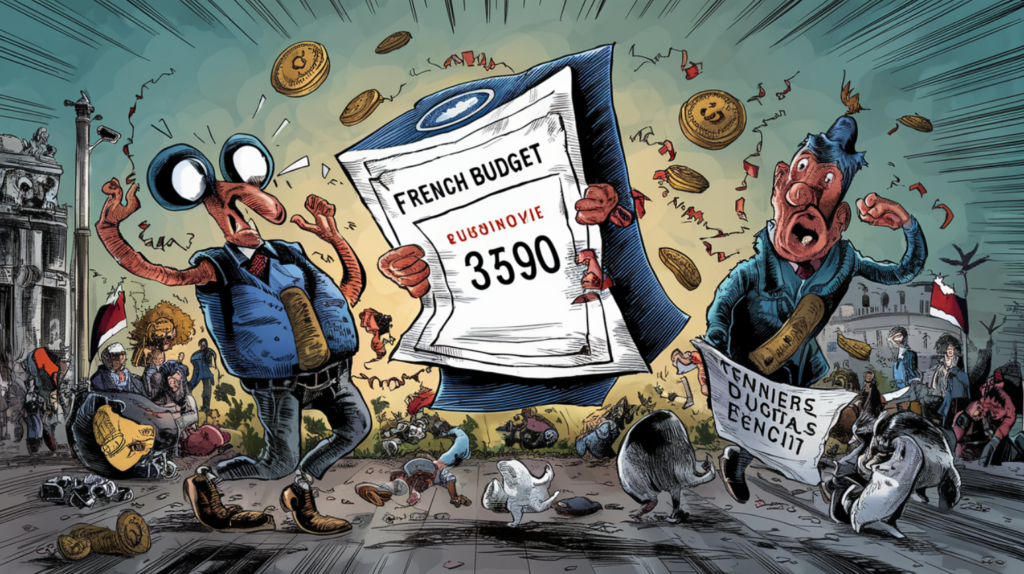Legislative chaos and 2025 budget, the ECB on alert
The legislative elections have increased the risk of political and financial instability in France. The Paris stock exchange has dropped nearly 5% since June 9 to cover the risk of facing instability in economic policies. While the public deficit is already considerable (nearly 5.1% of GDP in 2024), the 2025 budget seems impossible to conclude… Will France be able to hold economically in the coming months?
“Budget rules must be respected in the EU”
At the ECB forum in Sintra this Tuesday, July 2, ECB President Christine Lagarde stated that “budget rules must be respected in the EU.” This message to the States comes as France downgrades its deficit forecasts. Moreover, the ECB has spurred a reduction in key interest rates, which should theoretically benefit the States by reducing the interest burden. But the lack of clear budgetary guidance and the lack of control over public finances add risk to the markets. So how can budgetary rules be respected amid the looming political uncertainty?
The 2025 budget will add volatility to the markets!
For 2025, the preparation and adoption of the budget promise to be particularly delicate due to political instability. According to the rating agency Fitch, the political context “increases uncertainty about the country’s fiscal consolidation path and the prospects for further economic reforms.” The agency adds, “if no party obtains an absolute majority, it is unclear what a potential coalition government would look like or to what extent it would be stable.” Additionally, the excessive deficit procedure launched by the European Commission is set to constrain the 2025 budget.
“Furthermore, we expect France to be placed under the excessive deficit procedure this year. In any case, the next administration will be responsible for formulating corrective measures, as well as a medium-term adjustment plan in response to the European Commission’s assessment of debt sustainability within the framework of the reactivated EU budget rules.”
France’s Snap Election Heightens Fiscal and Reform Uncertainty (fitchratings.com)
The ECB to limit risks?
In 2009, the Greek debt crisis was about to erupt. The crisis was triggered by high budget deficits and unsustainable public debt. Added to this were questionable fiscal practices. As a result, interest rates on Greek bonds skyrocketed, making it impossible for Greece to refinance its debt. The risk was exponential.
To avoid a default, Greece received several bailout plans from the Troika (European Commission, European Central Bank – ECB, and International Monetary Fund – IMF). These interventions totaled over 260 billion euros. In exchange, Greece had to implement severe austerity measures, including budget cuts, tax hikes, and structural reforms.
In the case of France, such a scenario would heavily endanger the euro. So far, the euro is relatively stable and shows relative confidence despite the clear withdrawal of speculative investors. The ECB Vice-President, Luis de Guindos, considered that the recent rate increase was not sufficient to prompt intervention by the Central Bank. Consequently, this statement also indicates that the ECB can be attentive and active in case of a fiscal slippage. Recall that the ECB holds nearly 20% to 30% of all sovereign bonds in the euro area. Finally, in a recent paper, Reuters specifies that the ECB has no intention of discussing emergency purchases of French bonds.
“European Central Bank policymakers have no intention of discussing emergency French bond purchases and still believe it is up to French policymakers to reassure investors frightened by the prospect of a far-right government, five sources told Reuters.”
ECB in no rush to discuss French bond rescue, sources say | Reuters
How does the 2025 budget work?
As a reminder, the Finance Bill project (PLF) is prepared by the government, mainly by the Ministry of Economy and Finance. The process begins as early as spring of the previous year. At this stage, internal discussions within the ministries determine the main budgetary orientations.
From September, the PLF is submitted for examination by the National Assembly and the Senate. This passage through Parliament is marked by intense debates and amendments… and this is where things could get stuck! Deputies and senators discuss the different budget lines, propose modifications, and vote on each article of the project. The work in the finance committees and plenary sessions helps fine-tune the text.
The difficulty of the 2025 budget lies in the funding needs. Indeed, France is committed to reducing the deficit to 3% of GDP by 2027. Considering a deficit of 4% of GDP, France should find more than 25 billion euros in savings for the coming year alone. Moreover, it is a fortune in the current context… A first solution would be to increase the average levy by nearly 375€ per French person. Furthermore, this could be done directly (like VAT or income tax), or indirectly (like businesses, for instance). But the situation becomes more critical if political decisions also have the effect of increasing spending…
Can France survive a “debt attack”?
Moreover, French debt is growing faster than GDP under the Macron mandates. Therefore, the debt is not sustainable in the strict sense. Added to this, the debt service will represent the first budget of the State, ahead of education. That is to say, the main cause of deficit is the interest burden paid to… fill the deficit. However, other states like Italy also show even heavier indebtedness. It becomes clear that governments now have a partial or total dependence on market interests.
“French public debt is held 53.2% by foreigners. With a debt of nearly 3000 billion euros, France is one of the most lax countries in terms of spending in recent years. In 2023, the debt service, or the mere cost of interest, was close to 51 billion euros, or over 760€ per French person. This burden could climb to 70 billion euros by 2027.
Moreover, the average lifespan of French debt is close to 8 years. In this context, a sustained rise in the interest rate on French debt would lead to an increase in the debt cost. A rate close to 4%, like Italy, would result in more expensive debt issuances. In this example, the debt cost could reach nearly 100 billion euros in the long term. This is not sustainable today.”
Panique sur les marchés après la dissolution de l’Assemblée nationale – Cointribune
In summary, the legislative elections will determine the political framework for voting on the 2025 budget. The latter will be discussed starting from the return, and it could well disrupt France’s commitments… The ECB also reminds states of the need to manage their budgets. However, the ECB still excludes any emergency intervention in case the situation worsens. A destabilization of the euro would, however, necessitate ECB intervention. The CAC 40 remains below its levels before the dissolution, proof of investors’ distrust towards this political and economic fog.






